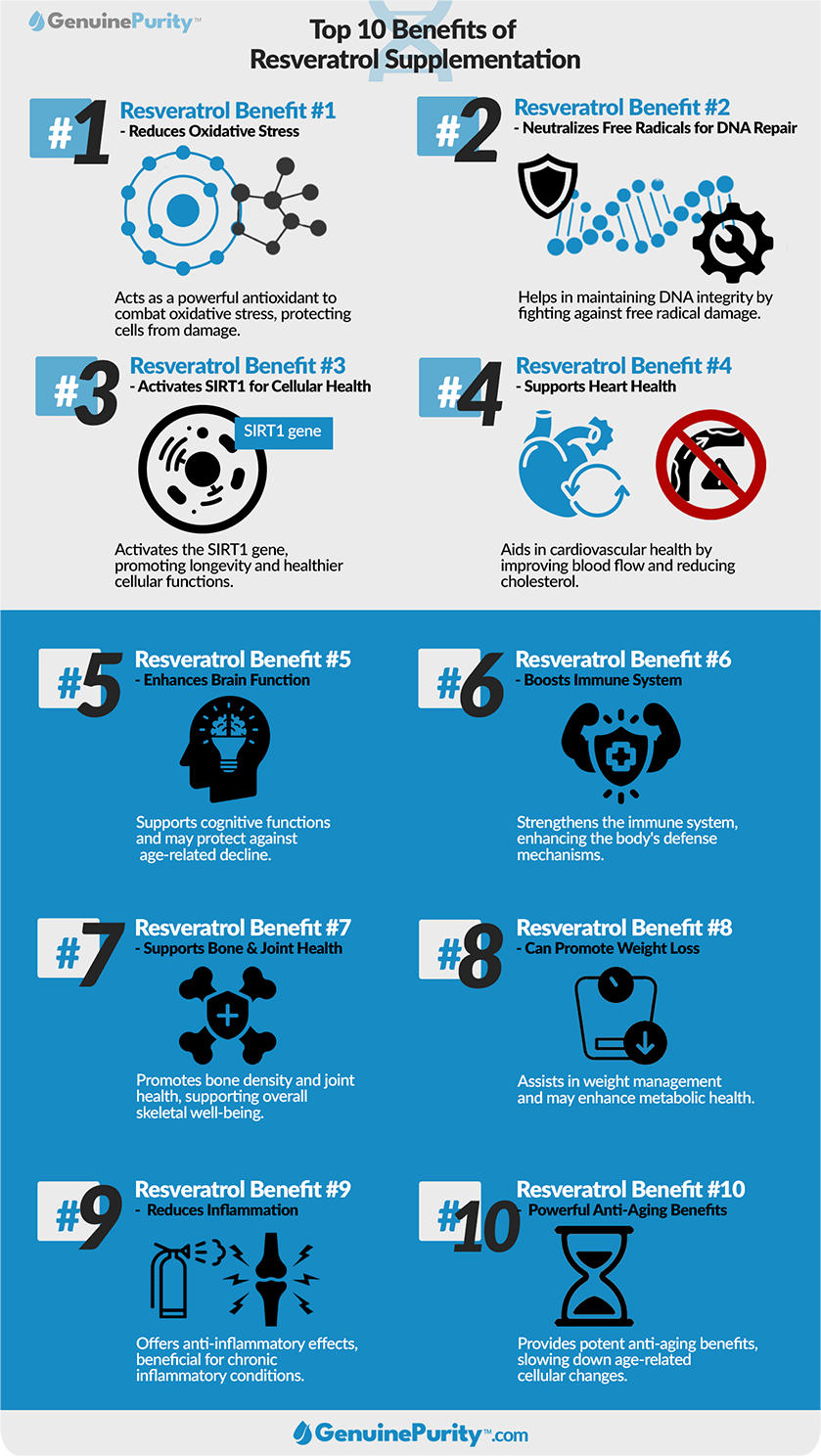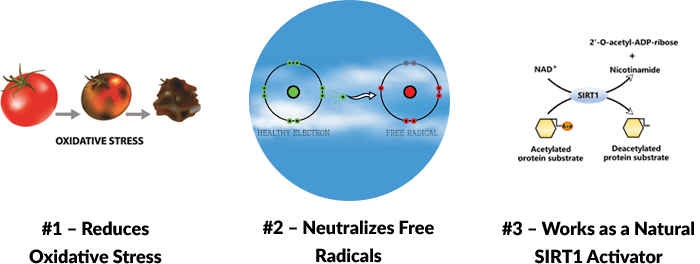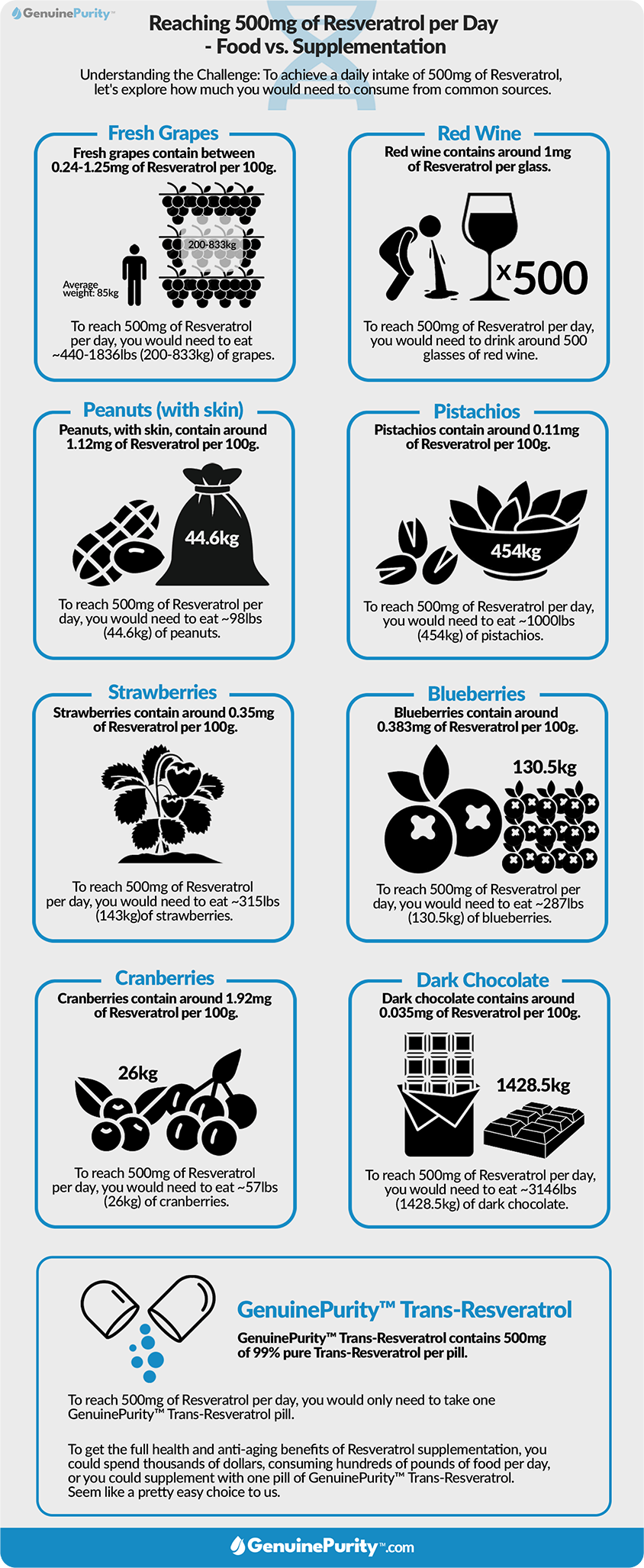Cellular aging is (and should be) a concern for us all. It’s what keeps us in a seemingly never-ending race against the clock. It’s what feeds our need to meet social goals before “it’s too late.” It’s what prods us to eat healthier and exercise more. And oftentimes, it’s what keeps us awake at night.
But thanks to science, there’s a potential light at the end of the tunnel.
It’s called Resveratrol (rez-vair-a-trawl), and it’s changing the way we think about cellular aging. This powerhouse compound offers a plethora of health benefits, giving us potential new ways to prevent, treat, and even reverse certain age-related concerns.
The future of Resveratrol looks extremely promising. Age researchers are currently looking into Resveratrol for a wide range of applications due to its pro-longevity benefits. As results from more and more human-based trials emerge, we’re likely to see the popularity of Resveratrol soar.
The science behind Resveratrol has volumes to say. But what is this age-defying compound? And how can we use it to promote our optimal health now and into the future? We’ll answer those questions and more. But first, let’s learn a little bit more about the origins of Resveratrol.
What is Resveratrol?
Resveratrol (3,4′,5-trihydroxy-trans-stilbene) is a polyphenol plant compound known in the science world as a stilbenoid. These are molecules characterized by two phenyl groups (bonded carbon atoms) linked by a transethane (non-polar) chain. Stilbenoids have an important role in many of our biological functions thanks to their antioxidative-like effects.1
Resveratrol works on a cellular level to provide behind-the-scenes benefits for those of us with age-related concerns. And while Resveratrol has been used in therapeutic capacities for more than 2000 years, it’s just recently been taken seriously as a potential age-defying compound in the last several decades.
Certain stilbenoids, like
Resveratrol, have been shown to:

In addition to the above, Resveratrol is also touted for its anti-inflammatory, anti-cancer, and anti-aging properties. Resveratrol is a well-known and regularly studied compound in the health and wellness arena.
More individuals are turning to Resveratrol supplements as “elixir of life” formulas thanks to their tried and true results. Resveratrol is a prescription-free option that offers long-term benefits for the user with very few if any, known side effects.
Unfortunately, there are a ton of Resveratrol products currently on the market. Some are worth taking, and some are decidedly not. Let’s take a look.
Resveratrol Vs. Trans-Resveratrol: Which is Best?
If you’ve been following the latest industry news, you’ve probably seen Resveratrol emerge as a major player in the anti-aging world. And while Resveratrol has a positive reputation, Trans-Resveratrol seems to be taking some of the credit for itself.
So, what’s the difference between Resveratrol and Trans-Resveratrol? Resveratrol is a naturally occurring molecule found in foods. Trans-Resveratrol is generally the actual active ingredient that you’ll find in health supplements and dietary aids.
Resveratrol is typically the name found on these products regardless of which compound is found within. And it’s not just because it’s easier to recognize and remember.
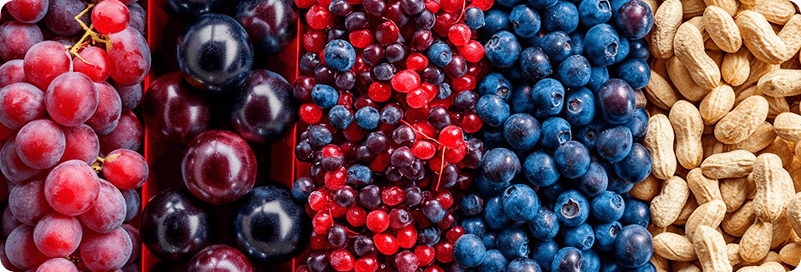
Resveratrol is essentially a precursor to Trans-Resveratrol.
When you consume foods (or supplements) containing Resveratrol, your body naturally converts that compound into smaller, more manageable to absorb molecules called Trans-Resveratrol.2
Your body can then absorb and use Trans-Resveratrol to its maximum potential. When it boils down to it, your body is getting usable amounts of Trans-Resveratrol no matter which compound you physically ingest.

So, which is best? Well, that depends.
Plant-based sources will only contain Resveratrol, which, as we learned, will naturally be converted to Trans-Resveratrol. The highest sources of Resveratrol will be found in the skins of grapes, berries, and nuts. However, the amounts found in foods will rarely be enough to raise levels to age-defying levels.
Health supplements may contain either Resveratrol or Trans-Resveratrol. The latter, Trans-Resveratrol, is slightly more costly for manufacturers to produce. However, consumers are able to essentially “skip the middleman” by opting for a supplement with Trans-Resveratrol.
Rather than waiting for your body to convert Resveratrol, it’s already introduced into your system and ready for use. You’ll need lower doses of Trans-Resveratrol to achieve the same results you would with Resveratrol. This minimizes potential side effects and makes a supplement more readily bioavailable.
Before opting for any health supplement, it’s a good idea to look at the overall formula to determine which active ingredients are found inside.
How Does Resveratrol Help with Cellular Aging?
There’s a lot of science and research behind Resveratrol’s pro-longevity benefits. When introduced into the body, Resveratrol mimics antioxidative behaviors on a cellular level. This makes Resveratrol a highly sought-after component of any longevity elixir formula.
Resveratrol can help with cellular aging for humans in several ways:
There’s no doubt that Resveratrol helps with cellular aging. And, as more evidence comes to light, supplement brands are realizing that Resveratrol isn’t just a “trend.” Resveratrol has proven itself effective time and time again. Its wellness claims are scientifically substantiated in countless clinical studies.3
Resveratrol is the real deal – and it’s here to stay. You’re likely to see some form of Resveratrol in nearly all longevity-providing supplements in the near future. We’ll take a closer look at each of the molecular mechanisms associated with Resveratrol below to learn why.

Oxidative stress is the principal cause of aging, especially in the brain.4 In fact, oxidative stress has been linked to a variety of age-related concerns like cancer, diabetes, eye diseases, neurodegenerative diseases, and so on.5
Recent studies have shown Resveratrol supplementation helps beneficially reduce oxidative stress markers.6 Those include pollution, inflammation, poor immune response, and incorrect management of ROS (reactive oxygen species) produced in the mitochondria (cells responsible for energy metabolism).7
In addition, Resveratrol helps increase cellular NAD+ levels for more pro-inflammatory effects.8 Inflammation is a major indicator of high ROS. However, Resveratrol inhibits both inflammation and oxidative stress through its antioxidative mechanisms.9 Thus mitigating the negative effects of cellular aging.

We know that Resveratrol is a powerful antioxidant. Resveratrol works on a cellular level to neutralize harmful free radicals that are known to damage DNA.10 This is done through a unique process that allows Resveratrol molecules to positively impact and regulate antioxidative enzymes.
In the case of natural antioxidants, like Resveratrol, neutralization of free radicals is achieved through two mechanisms:
Hydrogen atom transfer (HAT)
A process that donates a hydrogen ion from a stable molecule, thus allowing the antioxidant to scavenge and detoxify excessive oxidative stress.12
Single electron transfer (SET)
This method involves adding a single electron to the outlet layer of an enzyme to encourage protection from potential oxidative stress markers.13
Resveratrol has been shown to significantly reduce DNA damage caused by oxidative stress markers.14 As ROS-causing damage becomes lessened through cellular mechanisms, DNA is able to self-repair during a process known as cell-cycle arrest.15
In essence, Resveratrol works to minimize DNA damage and promote DNA repair to reverse the negative effects of cellular aging in ways never thought possible.

Resveratrol is a natural phytochemical (plant-based compound) and SIRT1 activator. 16 SIRT1 stands for sirtuin 1 (silent mating type information regulation 2 homolog). In fact, of all the natural SIRT1 activators discovered, resveratrol (3,5,4'-trihydroxystilbene) is the most potent to date.
All that essentially means is that Resveratrol has the same gene response for both plants and humans. Resveratrol is a powerful extract that contains phytoalexin – a protective antibiotic produced by plants in times of “danger.” And because Resveratrol is a SIRT1 activator, that same natural stress response found in plants can be helpful for humans. too.
Resveratrol’s ability to work on a cellular level makes it uniquely designed to both directly and indirectly detoxify harmful molecules within our system. When ingested by humans, the phytoalexins found in Resveratrol can aid in minimizing age-related conditions by:
While the research is promising, more clinical studies need to be done to determine the ideal daily dose of Resveratrol for long-term therapeutic benefits.
What is the Research on Resveratrol?
Research on Resveratrol is showing promising benefits for a wide range of therapeutic applications. Age researchers are touting Resveratrol as a powerful antioxidant that could potentially be the “elixir of life.” Health and wellness enthusiasts are racing to be the first in line to try this age-defying compound while manufacturers can’t produce Resveratrol-containing products fast enough.
But is Resveratrol just a hyped-up trend, or is it really here to stay? Based solely on research surrounding Resveratrol, the future is looking bright for this pro-longevity compound.
In addition to a wide range of anti-aging effects, Resveratrol is scientifically substantiated to have the following benefits:18

Cardiovascular Support:
Resveratrol is a unique molecular compound that works tirelessly to help us maintain optimal heart health. From increasing vital Nitric Oxide (N.O.) levels to dilating and relaxing blood vessels, Resveratrol offers substantial cardioprotective properties.
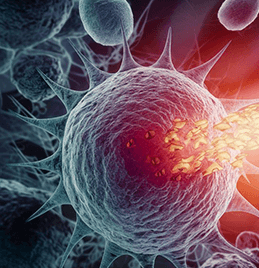
Anti-Cancer Potential:
Resveratrol has been shown beneficial as a therapeutic agent for various types of cancer, including the eyes, the breast, the kidneys, the liver, the prostate, the blood, the brain, the bladder, the thyroid, the ovaries, the esophagus, the stomach, lungs, skin and neck, bones, and cervix.

Metabolic Weight Loss:
Resveratrol improves blood sugar control and supports reduced fat formation by actively decreasing lipid accumulation. The powerhouse antioxidant also encourages improved insulin sensitivity, thus having anti-diabetic properties.
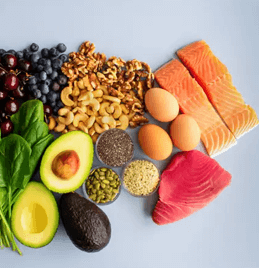
Anti-Inflammatory Effects:
Inflammation plays a role in several age-related conditions. Resveratrol has a number of anti-inflammatory properties that help maintain and repair tissue damage as well as facilitating the prevention of neurodegenerative, respiratory, metabolic, and cardiovascular diseases.19
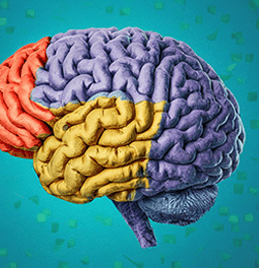
Brain Support:
Resveratrol has an important role in our brain health, too. Numerous studies have shown the anti-aging compound has a plethora of neuroprotective benefits, helping promote optimal brain health as we age.
At GenuinePurity™, we’re here to help you understand the latest research and news surrounding anti-aging products of all types. Learn more about the in-depth research on Resveratrol and the potential benefits you can expect with Resveratrol supplementation.
Are There Any Downsides to Resveratrol?
The biggest downside to Resveratrol boils down to affordability. Procuring a quality source of Resveratrol can be costly for manufacturers. Supplies are often limited, and as demand rises, a shortage of Resveratrol is likely. Manufacturers that can find Resveratrol will be forced to raise prices to accommodate this additional cost.
But affordability of the compound itself isn’t the only issue. Resveratrol is a fat-soluble molecule that makes oral supplementation more complex. If a manufacturer was to use traditional capsule-based methods for their supplements, the Resveratrol found inside would break down in the digestive tract before it’s able to be used by the body.
To prevent Resveratrol from being pre-absorbed by the mouth or stomach acid, manufacturers need to think outside the box. There are a few methods for getting Resveratrol where it needs to go, but all of them come at a cost. The most advanced way to prevent volatile compounds like Resveratrol from prematurely breaking down is Liposomal Encapsulation.
Liposomal Encapsulation is a relatively new drug delivery system (DDS). It consists of surrounding an active ingredient in protective bi-layer lipids for delivery where it can be absorbed directly by the intestines – where it can be the most effective. Users can take advantage of smaller doses of Resveratrol with higher-end results thanks to Liposomal Encapsulation.
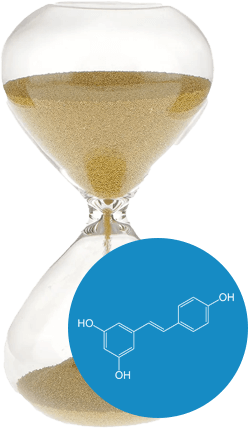
How Old is Resveratrol?
Resveratrol has been effectively used in traditional medicine for over 2000 years. In the past, Resveratrol was originally extracted from natural sources such as plants, fruits, and the processed derivatives thereof.20
Scientists noticed Resveratrol’s ability to exhibit a wide range of potential health properties and began studying the compound. They found that Resveratrol was able to offer such a diverse array of advantages due to its molecular structure.
Researchers found the basic structure of Resveratrol to be somewhat unique. Thanks to 2 polyphenol rings bonded with double styrene bonds, Resveratrol is able to bind with various biomolecules found within the human body.
This began an extensive study on the unique molecule. Scientists found that while Resveratrol has a plethora of beneficial properties when consumed, it is much too rapidly absorbed by the body. We’d have to consume high amounts of Resveratrol-containing plants and fruits to achieve actual health benefits.
In 1939, Resveratrol was first isolated from the root of Veratrum grandiflorum by a researcher named Takaoka. In 1940, Takaoka classified Resveratrol as a powerful stilbene agent, skyrocketing further research on the potential age-defying compound.21
During in vitro and in vivo studies on both animal and human models, it was discovered that Resveratrol could be a potent SIRT1 activator. But there was still a problem with bioavailability. Researchers had to find a way to maximize the benefits by isolating and extracting the molecule’s therapeutic properties.
Over the last several decades, the research on Resveratrol has become a hot topic among scientists.22
What Advances Have There Been for Resveratrol?

Resveratrol is now a well-known compound in the anti-aging industry. Scientists have identified various ways in which Resveratrol can positively impact chronic metabolic diseases in humans. Resveratrol is currently being studied for its potential ability to prevent, treat, and even reverse health conditions that affect our general well-being and longevity.23
While scientists and age researchers understand the potential for Resveratrol, ideal dosages are yet to be determined. They’ve even determined up to 70% of the ingested resveratrol has been found to be bioavailable in humans based on the levels appearing in the plasma. The difficulty lies within Resveratrol’s ability to reach targeted tissue.
As more research on Resveratrol comes to light, optimal doses, and delivery systems can be effectively determined. Current clinical trials show that it's safe to take resveratrol in doses of up to 5000 mg per day. However, more research needs to be done to identify optimal doses for specific concerns.24
What is Resveratrol Made of?
Resveratrol micronutrient compound that is found naturally in 70 different plant species, such as grapes, berries, peanuts, and pines.25 While a 5000 mg serving is technically deemed safe to take, we likely need a much lower dose to achieve our general health goals.
There is no current recommended daily dose for Resveratrol. However, dietary aids and Resveratrol supplements typically contain 100 mg, 250 mg, or 500 mg of Resveratrol per serving.
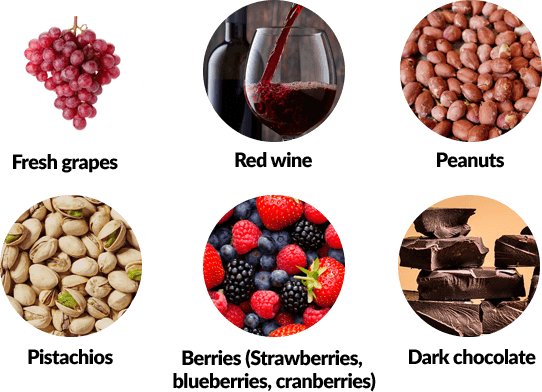
While it is possible to get Resveratrol from food sources, the doses likely won’t be high enough to achieve age-defying benefits. Happily, scientists have been able to extract Resveratrol for maximum oral dosages for therapeutic applications. You can get all the Resveratrol you need in a single once-daily pill.
How Do You Take Resveratrol Supplements?
Resveratrol supplements can be found in grocery stores in the vitamin aisle or purchased online from the comfort of your own home. Resveratrol is a low-risk supplement that has no known side effects when taken correctly. Resveratrol doesn’t require a prescription.

Consume supplements with a meal as Resveratrol is fat-soluble.

Take supplements in the morning to avoid late-night energy.

Look for Resveratrol supplements with a 50%+ purity.
Most Resveratrol supplements are taken once per day. However, you should always follow the recommended dosages on a per-supplement basis. If you’re currently on any medications that may interact with Resveratrol, consult your doctor before adding a new supplement to your routine.
Can You Take Resveratrol with NMN?

Yes. Resveratrol and NMN are two compounds that work on a cellular level to produce age-defying outcomes. Both supplements have properties that can achieve some pretty amazing results on their own. But when combined, Resveratrol and NMN offer up synergistic outcomes for a longer, healthier life.
Is Resveratrol and NMN the powerhouse combo you need?
Whether you’re looking to maintain optimal health in a hostile world filled with harsh environmental stressors or you’re on the hunt for a regime that will keep you looking (and feeling) younger than ever, a Resveratrol and NMN combo could help.
Combining Resveratrol and NMN supplements can potentially:26


Help you maintain good general health

Promote a longer lifespan
Anti-aging cocktails are likely to be our first line of defense against cellular aging in the very near future. However, more specific long-term trials on Resveratrol and NMN need to be done to determine the safety and efficacy of combining these two anti-aging molecules.
Should You Be Taking Resveratrol – The Age-Defying Compound?
Cellular aging is a major concern for many adults. However, we’re lucky to live in a day and age where science trumps all. Age researchers are identifying ways to minimize the effects of aging on a cellular level.
Instead of opting for products to address the symptoms of aging, we can finally take the fight to the frontlines with therapeutic options that work behind the scenes to keep us in optimal health.
The science behind Resveratrol shows promising outcomes for a wide range of health and wellness-related applications. From boosting our physical and mental health to promoting a longer lifespan, Resveratrol covers all the bases and then some.
Resveratrol could be the age-defying compound you’ve been looking for if:
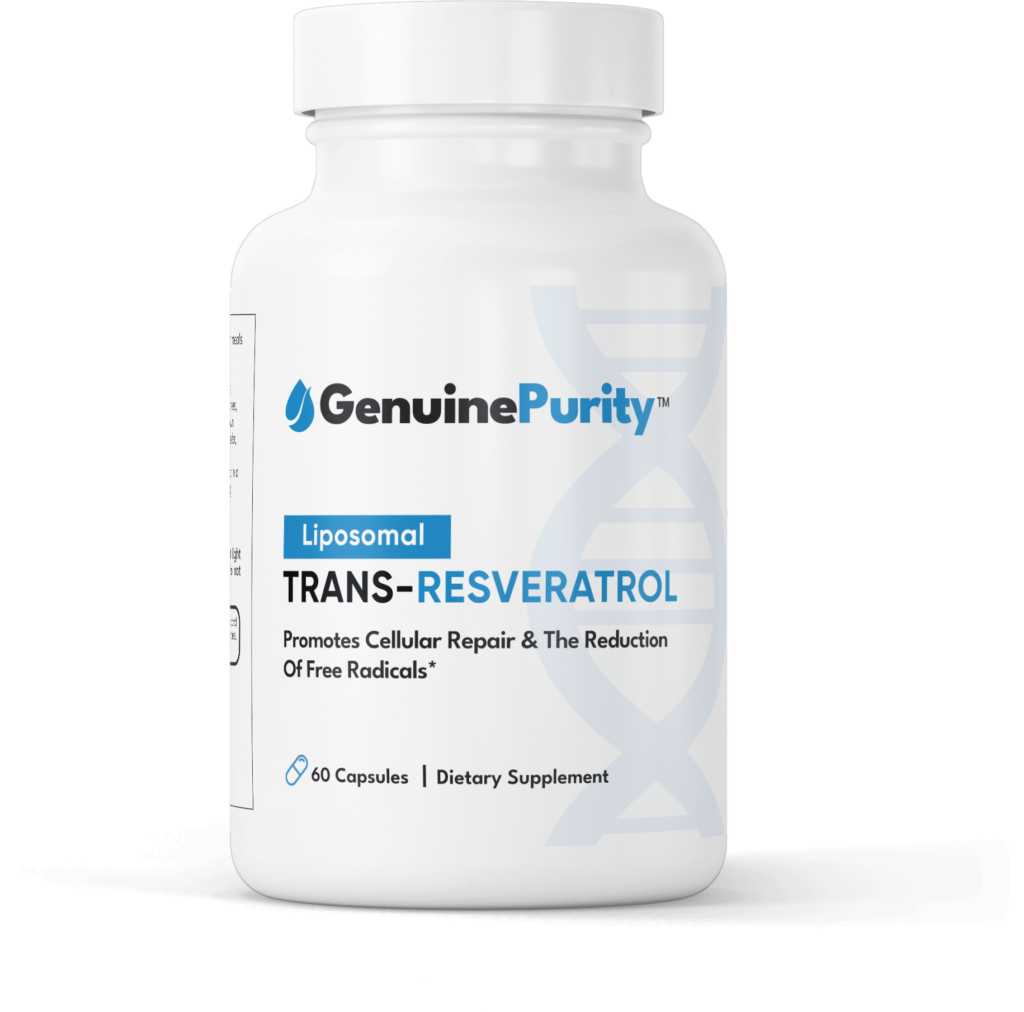
GenuinePurity® Trans-Resveratrol
Discover the exceptional benefits of GenuinePurity® Trans-Resveratrol, featuring 98% pure trans-resveratrol in the optimal 500mg clinical dose. Unlike many competitors offering the wrong form of resveratrol with limited bioavailability, GenuinePurity delivers the scientifically validated "trans" isomer that research shows produces remarkable health benefits. The pharmaceutical-grade liposomal encapsulation technology ensures maximum absorption and effectiveness, addressing the natural limitations of resveratrol's water solubility.
GenuinePurity® Trans-Resveratrol supports multiple aspects of your health and longevity. Sourced from resveratrol-rich Japanese Knotweed roots, this premium supplement helps maintain healthy blood sugar levels, improves overall blood pressure, provides robust heart protection, and enhances cognitive function. Additionally, resveratrol has been proven to extend lifespan in various studies by activating SIRT1, mimicking the benefits of caloric restriction, and improving mitochondrial function. Made in the USA in cGMP-certified facilities, GenuinePurity® Trans-Resveratrol offers exceptional quality and purity for those seeking comprehensive support for their health and longevity goals.
Endnotes
- https://www.ncbi.nlm.nih.gov/pmc/articles/PMC5877653/#:~:text=In%20summary%2C%20stilbenoids%20exert%20various,by%20several%20universal%20signaling%20pathways.
- https://www.sciencedirect.com/topics/chemistry/trans-resveratrol
- https://www.ncbi.nlm.nih.gov/pmc/articles/PMC7143620/#:~:text=Resveratrol%20has%20antioxidant%2C%20anti%2Dinflammatory,%2C%20diabetes%2C%20Alzheimer's%20disease%2C%20and
- https://www.sciencedirect.com/science/article/abs/pii/B978012818698500033X#:~:text=Resveratrol%20reduces%20oxidative%20stress%20and%20inflammation.&text=Resveratrol%20attenuates%20effects%20of%20normal%20aging%20on%20the%20brain.&text=Resveratrol%20offers%20protection%20against%20neurodegenerative%20disease%20development.
- https://www.sciencedirect.com/topics/agricultural-and-biological-sciences/oxidative-stress
- https://pubmed.ncbi.nlm.nih.gov/31738139/
- https://corconinternational.com/oxidative-stress-what-is-causes/#:~:text=The%20main%20causes%20of%20oxidative,metabolic%20reactions%20(Figure%201).
- https://www.ncbi.nlm.nih.gov/pmc/articles/PMC7587336/#:~:text=AMPK%20increases%20cellular%20NAD%2B%20levels,leading%20to%20anti%2Daging%20effects.
- https://www.nature.com/articles/srep25342
- https://www.ncbi.nlm.nih.gov/pmc/articles/PMC7796143/#:~:text=Resveratrol%20exhibits%20strong%20antioxidant%20activity,DNA%20damage%20by%20free%20radicals
- https://www.sciencedirect.com/science/article/pii/S2772753X2300360X
- https://pubs.acs.org/doi/10.1021/acs.langmuir.2c02021
- https://www.tandfonline.com/doi/pdf/10.1179/1351000213Y.0000000063
- https://academic.oup.com/carcin/article/29/2/321/2896185
- https://www.sciencedirect.com/topics/medicine-and-dentistry/cell-cycle-arrest#:~:text=Cell%20cycle%20arrest%20is%20a,et%20al.%2C%202011).
- https://www.ncbi.nlm.nih.gov/pmc/articles/PMC3613783/#:~:text=Analysis%20into%20recent%20studies%20have,pathways%20%5B9%E2%80%9311%5D.
- https://www.tandfonline.com/doi/full/10.2147/cia.S12159937
- https://www.sciencedirect.com/science/article/pii/S0753332221009483#:~:text=Resveratrol%20will%20activate%20SIRT1%20expression,inducing%20sirtuin%20expression%20%5B143%5D
- https://www.ncbi.nlm.nih.gov/pmc/articles/PMC6032205/
- https://www.ncbi.nlm.nih.gov/pmc/articles/PMC4499410/
- https://www.ncbi.nlm.nih.gov/pmc/articles/PMC6319551/#:~:text=Resveratrol%20(3%2C4%E2%80%B2%2C,)%20(Takaoka%2C%201939)
- https://www.ncbi.nlm.nih.gov/pmc/articles/PMC3348475/
- https://www.ncbi.nlm.nih.gov/pmc/articles/PMC3348475/
- https://www.ncbi.nlm.nih.gov/pmc/articles/PMC6317057/
- https://pubmed.ncbi.nlm.nih.gov/12010007/#:~:text=Major%20dietary%20sources%20include%20grapes,for%20heart%20disease%20and%20strokes
- https://www.ncbi.nlm.nih.gov/pmc/articles/PMC9861325/


